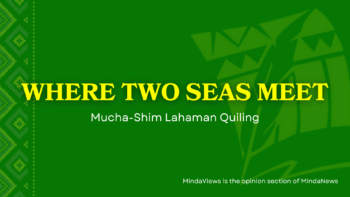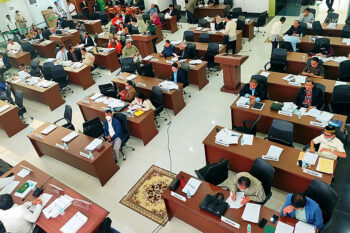
ZAMBOANGA CITY (MindaNews / 2 Aug)—Marben Asari, a Tausug nurse working in the Middle East, posted a comment on his Facebook page: “Could you please send me even a spoonful of mantakilya? I will take care of the bread.” Firstly, it is evident that he is well-aware of the fruit season in Sulu. Secondly, he knows that due to the oversupply of duyan (durian) flooding the local market, the common practice is to preserve it in a sugary concoction as a durian jam.
Mantakilya is a Tausug word for durian in a sugary concoction (durian jam and durian spread), commonly used as a spread for tinapay (pan de sal) and “brid” (sliced breads) by locals. It is prepared for several reasons: firstly, to mitigate the oversupply and reduce spoilage of durian. Secondly, it allows the availability of durian in mantakilya form beyond the regular season for the family or to be served for visitors. Lastly, durian in mantakilya form from Sulu serves as gifts and “pasalubong” for family members, relatives, and friends who reside outside of Sulu. These recipients may have learned about the fruit season and have been eagerly anticipating it, reaching out to acquaintances on Jolo Island. In cases where sending fresh durian is not feasible, mantakilya becomes the next best alternative.
The Tausug mantakilya may have originated from the Spanish loanword “mantequilla,” which means “butter.” However, the similarity between the two ends with the name. In Sulu, “mantakilya” is meticulously prepared by Tausug women, who possess the knowledge and expertise to make it both savory and long-lasting. At home, we had the experience of mantakilya being prepared by our Tausug father, who is an experienced cook. Interestingly, those who have gained recognition for their skill in preparing durian jam are frequently approached and commissioned by affluent individuals and families to create this delectable treat for them.
To prepare the mantakilya, first, the durian meat is separated from the huge seed. Then, it is placed in a large and deep pan with brown sugar. The mixture is stirred for hours until the meat blends perfectly with the brown sugar, resulting in a sticky concoction. Afterward, it is left to cool before being carefully bottled and covered.
On Jolo Island, every resident has cherished visual memories of their grandmothers, aunties, mothers, and elder sisters passionately cooking durian jam until the wee hours of the morning. They stir it continuously on a low fire until the right consistency is achieved. Moreover, every Tausug individual has fond memories of taking part in its preparation. As kids, the tasting part is the most enjoyable moment for them!
Naming the bottle, or the act of reserving the durian jam container for a particular individual, is a tradition rooted in gratitude. It signifies that those who have shown kindness and generosity in the past are more likely to be remembered and receive a greater supply of mantakilya compared to others. On the other hand, the stingy ones are often forgotten or given less priority in this practice.
In the past, mantakilya was not sold; instead, it was prepared for household consumption and freely shared within one’s circle of family and friends. However, in the present day, durian jam has become a source of livelihood. Bottled jams are now being sold not only in the local market in Jolo but also in malls in Zamboanga City.
On a personal note, I fondly recall my own experience of preparing, giving, sharing, and receiving mantakilya. The feeling of receiving this delicious treat is always heartwarming. However, it is not just about the gift itself; there’s a deeper meaning behind every bottle of mantakilya. It signifies that our relatives remember us and care for us enough to prepare and send it to us.
Beyond the act of being remembered, it serves as a beautiful reminder of the importance of giving. It teaches us that a giving hand is far more valuable than a receiving hand. It symbolizes the virtue of giving selflessly, where we give with our right hand without our left hand being aware of it, demonstrating true humility and sincerity in our acts of kindness.
(MindaViews is the opinion section of MindaNews. Noor Saada is a Tausug of mixed ancestry—born in Jolo, Sulu, grew up in Tawi-Tawi, studied in Zamboanga and worked in Davao, Makati and Cotabato. He is a development worker and peace advocate, former Assistant Regional Secretary of the Department of Education in the Autonomous Region in Muslim Mindanao, currently working as an independent consultant and is a member of an insider-mediation group that aims to promote intra-Moro dialogue.)






